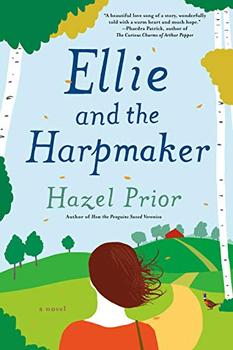Summary | Excerpt | Reading Guide | Reviews | Beyond the Book | Read-Alikes | Genres & Themes | Author Bio

This article relates to Ellie and the Harpmaker
 Exmoor, England is the setting for Hazel Prior's debut novel, Ellie and the Harpmaker. Designated a national park in 1954, the 267-square-mile area is divided 70/30 between Somerset and Devon counties in the southwestern corner of the country and is home to about 10,600 people. The area's landscape is incredibly varied; its rugged headlands to the north are divided by narrow, forested valleys (called "coombs"), which rise to an inland plateau of heather moors about 1000' above sea level. Many consider it to have one of the most remote shorelines in England due to its exceptionally wooded coastline and steep sea cliffs (the highest on the British mainland). The forests contain the largest stretch of woodland in the country, and over 200 miles of rivers and streams flow through it, including the River Exe, from which Exmoor takes its name.
Exmoor, England is the setting for Hazel Prior's debut novel, Ellie and the Harpmaker. Designated a national park in 1954, the 267-square-mile area is divided 70/30 between Somerset and Devon counties in the southwestern corner of the country and is home to about 10,600 people. The area's landscape is incredibly varied; its rugged headlands to the north are divided by narrow, forested valleys (called "coombs"), which rise to an inland plateau of heather moors about 1000' above sea level. Many consider it to have one of the most remote shorelines in England due to its exceptionally wooded coastline and steep sea cliffs (the highest on the British mainland). The forests contain the largest stretch of woodland in the country, and over 200 miles of rivers and streams flow through it, including the River Exe, from which Exmoor takes its name.
The area is well-known for its environmental and archaeological treasures. There is evidence of continual human habitation from as early as the Mesolithic period (8000-4000 BCE), and it contains many undisturbed archaeological sites, including standing stones and burial mounds. Aerial surveys and ground-penetrating X-rays have revealed the remains of prehistoric hut circles and field systems that are believed to date from the Neolithic (4000-2000 BCE) and Bronze Age (2000-700 BCE). The Romans took advantage of Exmoor's iron mines, and built forts on some of the hilltops. The not-to-be-missed Tarr Steps – a stone bridge across the River Barle – may have been built as early as 1000 BCE, making it the oldest surviving structure of its kind.
Unlike in the United States, people often live and work in Britain's national parks. According to the Exmoor National Park website, most of the settlements in the area (comprised of farms, hamlets and villages) have existed on their current sites for hundreds of years, with some buildings dating back to the Middle Ages. Dunster Castle and its surrounding village is generally considered to be the best-preserved medieval village in England. About a quarter of Exmoor is open moorland, upon which farmers graze their sheep as they've done for the past 3,000 years, according to historical record. The area was also designated a royal hunting preserve from at least 1300 to 1815, at which point the Crown, in desperate need of funds to finance the Navy, relinquished control of the territory and sold it to private owners.
Because of the park's rich history, Exmoor today has become a popular tourist destination. Those who are looking for a trip to the past often tour the area's historic buildings such as the Dunster Yarn Market and the ancient Cleeve Abbey, and may stop in for a pint at one of Exmoor's many pubs.
Exmoor also appeals to outdoor enthusiasts. There are opportunities for fishing on its many lakes, rivers, and along the coast, and other watersports such as canoeing, kayaking, windsurfing, and stand-up paddle boarding are prevalent as well. Wildlife watching is quite popular, too, with the park's diverse bird population; its 3000+ wild red deer herd, the largest in the nation; and the Exmoor ponies, Britain's oldest breed of native horse (an even-tempered breed, popular with children and sturdy enough for adults). To learn more about the Exmoor ponies and catch a glimpse of them roaming the park's landscape, click on the video at the bottom.
Exmoor's trails are frequented by horseback riders and mountain bikers, while its quiet, remote roads are used by road cyclists. Hiking is also a popular activity within the park, which has 600 miles of signed footpaths. The South West Coast Path, the longest National Trail in England and Wales, starts along the Exmoor Coast, and the section within the park's borders contains the highest and remotest parts of the path. Finally, there's star-gazing; Exmoor was designated the first international dark sky reserve in 2011.
With an abundance of recreation opportunities and natural beauty, it's easy to see why over 2 million visitors flock to Exmoor annually.
by Kim Kovacs
Photo of Malmsmead Hill, Exmoor, courtesy of Kevin Young
Filed under Nature and the Environment
![]() This article relates to Ellie and the Harpmaker.
It first ran in the August 21, 2019
issue of BookBrowse Recommends.
This article relates to Ellie and the Harpmaker.
It first ran in the August 21, 2019
issue of BookBrowse Recommends.
Knowledge is of two kinds. We know a subject ourselves, or we know where we can find information on it.
Click Here to find out who said this, as well as discovering other famous literary quotes!
Your guide toexceptional books
BookBrowse seeks out and recommends the best in contemporary fiction and nonfiction—books that not only engage and entertain but also deepen our understanding of ourselves and the world around us.